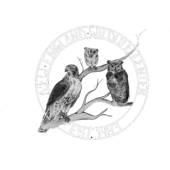On Cape Cod, we have either a Department of Natural Resources, or Animal Control Officer, or both in almost every town. These agencies work with wildlife to help keep them safe and protected. They are often called upon to help capture an injured or sick wild animal and will do it skillfully, and if necessary, then will transport it to a wildlife hospital like Cape Wildlife Center for any further treatment. Sometimes, the best option is to let the animal stay in its natural environment, and they help to do that also. The following story speaks to the positive outcome that occurs when wildlife agencies work together to save an animal.
THE OWLS OF PLEASANT STREET
On March 12 2020, the Cape Wildlife Center received a call from Yarmouth Department of Natural Resources. They were notified by two women walking on Pleasant Street in Bass River that two young owls had fallen out of their nest. The wildlife center immediately sent out a rescue team of staff including wildlife rehabilitators to meet up with Officer Bill Bonetti of Yarmouth Dept of Natural Resources. It was determined that they were Great Horned Owlets in good condition. Both parents were watching from above. The nest was destroyed so we built a new one from a wicker basket and screwed it to a tree. We placed the owlets in it and let the mother take over. Volunteers checked the nest twice daily for any problems.
Baby owls grow quickly and it was soon discovered that with the weight of the mother on the nest, it was going to be too heavy so the team came back and replaced the wicker nest with a larger rubber bucket with holes drilled in the bottom. We filled it with nesting material, put the babies back , and let the mother take over. She immediately went to the new nest and took charge. The daily monitoring continued.
On April 6, one of the owls was found by our volunteers out of the nest. The team re -assembled , and with the help of a good Samaritan who climbed the ladder, the owl was returned to the nest. We knew they were at the branching stage, but there were no branches nearby, which would just lead to more drops from the nest. Our next step was to find downed branches and screw them around the nest site to give them some perching material.
The owls wanted to leave despite our best efforts. The next day they were both gone from the nest. This was a concern because if they couldn’t get off the ground, they would be easy pickings for predators of all kinds. Our team began a search again and found, one of them perching on a branch far away from the nest about 8 feet off the ground with the mother swooping above him. At this point they were able to get themselves off the ground, the parents were still caring for them, and protective and attentive, so it was decided it was in their best interest to let the mother take over. We continued monitoring daily.
One morning, our volunteers found the two babies branching side by side with the parents above. What a win.
The Cape Wildlife Center always tries to re-nest wildlife first before we take them into our facility. It is truly what is best, and we are overjoyed this one was so successful. This re-nest involved multiple good Samaritans, the Department of Natural resources, Cape wildlife Center staff, rehabilitators, and volunteers. Hours each day for months have been spent to assure this positive outcome. All this at a time when the center was working on a skeleton staff crew, and were all masking, gloving and social distancing. There were a lot of challenges along with the rewards.
Update: September 1 2020. The two young owls have grown into healthy, beautiful juveniles. They are still sharing the pine forest with their parents and continue to learn hunting and survival skills that they will need to insure their future.
To learn more about the Cape Wildlife Center or help in their mission, visit www.capewildlifecenter.com or call 508 362-0111.
Caryn Ritchie is the volunteer coordinator for the Cape Wildlife Center and holds both a Massachusetts rehabilitator’s license and a federal permit to rehabilitate migratory birds.

Recent Comments